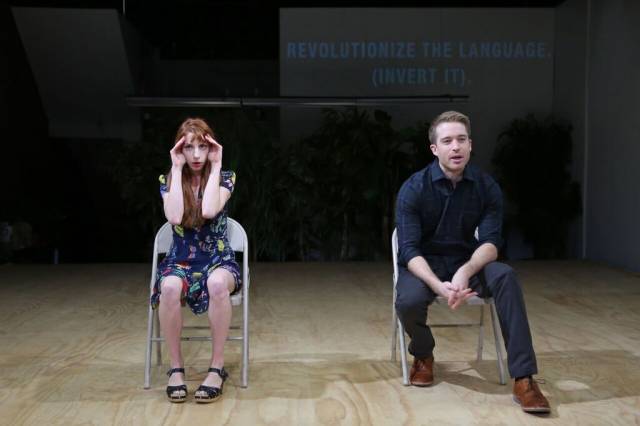

Currently onstage at Soho Rep for its U.S. Premiere, Alice Birch's Revolt. She Said. Revolt Again. could perhaps be best described as exposure therapy -- an uncomfortable, infuriating and brilliant indictment of a patriarchal world that has always policed women's bodies and minds.
Birch's play starts out as a witty, straightforward exploration of the ways in which day to day experiences can discredit and disempower women. Each vignette becomes a primer on a method to "Revolutionize The World" (a screen projects each step in all capitals).
The first conversation, "Change the Language," focuses on semantics, as a man (Daniel Abeles) sits across from the object of his affection (Molly Bernard) and makes love to her, telling her the things he adores about her body and what he wants to do to her. With the woman's objections to each advance, she sheds a light on the problematic aspects of the vocabulary. "I want to make love to you," he insists. "With me?" she challenges. Often her quips are funny, and the scene is consensual and lighthearted -- an unfortunately progressive and rare dialogue, as even the man in the scene seems less and less eager to play along as the discussion continues.
The two following scenes challenge the normalcy of marriage, as a woman (Jennifer Ikeda) balks at her boyfriend's proposal, and our consumer-driven, male-controlled workplace. "I'm not going to work Mondays anymore," Eboni Booth, the employee, says bluntly to her boss.
In the accompanying scene for step four, "Revolutionize the Body: Make it Sexually Available. Constantly." the play begins to transform into something somewhat more poetic, complex and unwieldy than the beginning. After being caught for stripping naked in a grocery store, Molly Bernard delivers a chilling, gorgeous monologue to two store employees on the constant threat of sexual violence women live with, trapped in an impossible set of contradictions that rend us from ownership of our own bodies.
Themes weave through the otherwise disconnected scenes including a yearning for nature, bluebells, nightingales, and fruit. The women are all exhausted, tongue tied, and frustrated. This underlying threat of violence and confusion comes to a head in the next revolutionary idea: Do Not Reproduce, as the play's three actresses play three generations of a family trying to make sense of a history of abuse and the accepted normalcy of the maternal instinct.
As led by director Lileana Blain-Cruz, the four person cast is fearless, willing to embody the spectrum of emotion and physical surreality the play demands. Their commitment makes the more uncomfortable parts of the play hard to watch -- but also impossible to turn away from. Adam Rigg's set and Yo Zhao's lighting design are minimal and slick. Neon pink lights drench the trees and stage with the first three conversations playing out in a bare set with white walls and wood floors. But as the play becomes increasingly bold and complex, the stage is filled with plants, blinding lights flash and smoke envelops the audience -- a horrible, furious wake up call that leads to the play's ultimate, apocalyptic vision, one that dares to envision our current system of power and order, eviscerated. It is a jarring vision -- a strange fruit -- but for those who live with the rising frustration of gender inequality, it's one that you may find a sense of peace in.